The Carolina Hurricanes’ season is over. It may have been a disappointing finish, but they put up a good fight against a juggernaut Tampa Bay Lightning team. It was a five-game series and a second-round exit, but the ‘Canes were competitive in every game, and there are lots of positives to take away from their fantastic season.
Sometimes, however, it can be easy to shoulder the blame when you don’t quite live up to your own personal expectations. That may be the case for Andrei Svechnikov, a guy the Hurricanes rely on for scoring goals and creating trouble around the net. Unfortunately, he wasn’t at his best in these playoffs, and it was a similar story throughout the regular season as well.
All those factors will come into play when he gears up to sign a new contract this offseason. A pending restricted free agent (RFA), Svechnikov and the Hurricanes will be negotiating his first big-league contract, and the outcome of that deal will make a major impact on the other decisions the Hurricanes’ front office will soon be making.
Svechnikov’s Side of the Fence
Teams and players don’t always see eye-to-eye on their first professional contract, but the Hurricanes and Svechnikov seem to be on the same page. Svechnikov’s popularity in the locker room is undeniable, and he receives constant praise from his head coach Rod Brind’Amour as well.
The feeling is mutual with the second-overall pick in 2018. Few players have connected as well with the team and fans like he has, and all those factors make it seemingly inevitable that Svechnikov will remain a Hurricane for a very long time.
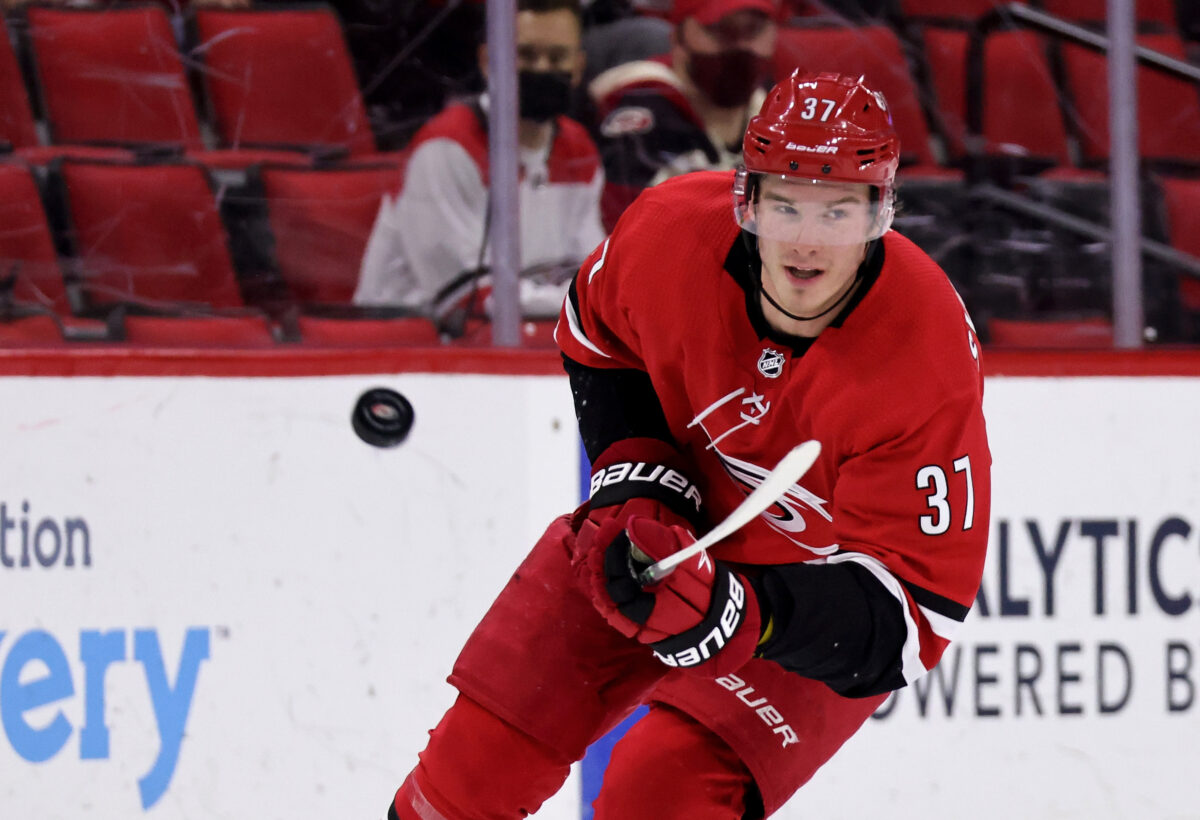
But that doesn’t mean he’s going to be gifted the world. There are plenty of elements involved in gauging the price and term of a star player like Svechnikov, and certainly how it affects the team as a whole.
For now, it may be in Svechnikov’s best interest to look at a bridge-type deal of two or three years. He’s coming off a season in which he took a surprising step back from his stellar 2019-20 campaign. He scored 61 points in 68 games that season – including 24 goals – and added seven points in six playoff games in the 2020 bubble.
This year however, Svechnikov struggled to find any kind of consistency, especially in finding the back of the net. He scored 15 goals in 55 games, and of his 42 total points, only 25 came at even strength. The playoffs was no different – he was always willing to engage physically and play the playoff-style game, but his offense just faded into the background. He was limited to just two goals in 11 postseason games.
It’s certainly not uncommon for a young player to experience setbacks. Svechnikov came into the league at just 18 years old. Now 20, he’s still figuring out the game and all of its intricacies at the NHL level. The progress in his development has certainly been noticed through his three years in the league. Even if his point totals took a hit this year, he’s established himself as one of the Hurricanes’ most competitive forwards who offers a unique blend of puck skills, speed and physicality. Those players are rare, and when you find them, you hold onto them.
On Svechnikov’s side of the fence, a short-term deal, in which he can show he really is worthy of a contract comparable to the elite players of the NHL, could be his asking mark. A bridge deal is fine for the Hurricanes as well, as it would give them a bit more room to manage their other pending RFAs like Jake Bean, Warren Foegele and Alex Nedeljkovic. But that could come back to bite them later if Svechnikov pops off in the next two seasons, which would considerably drive up his future asking price.
What the Hurricanes Want
It would mostly benefit the Hurricanes to sign Svechnikov to a long-term contract that would lock him up for a more affordable value. I don’t think there’s anyone who would complain about inking one of their highest draft picks in history to a seven-year deal. That’s one core piece they wouldn’t have to worry about for the foreseeable future, and it gives them the guarantee they’ll be competitive for at least the next three years, as all of Sebastian Aho, Teuvo Teravainen, Jaccob Slavin and Brett Pesce will still be on the books.
Svechnikov’s value is at an all-time low right now. It feels weird to say that, but this may be the best opportunity to lock him into a team-friendly deal that allows general manager Don Waddell to spend money elsewhere to improve the depth of next year’s team.
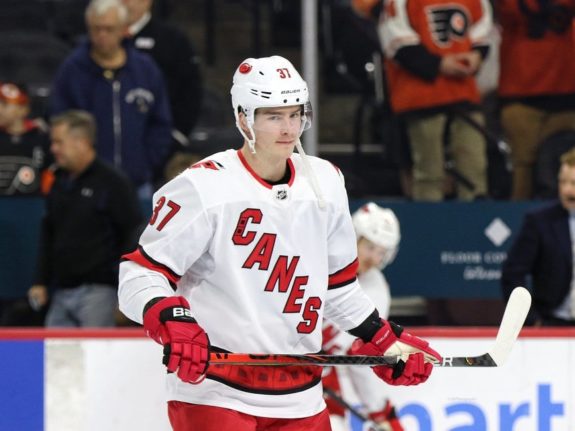
The Hurricanes have major decisions to make this summer, most notably with unrestricted free agent (UFA) Dougie Hamilton. Hamilton has been given permission to speak with other teams, but he’s also said he’s more than open to re-signing with Carolina. Since he’s a UFA however, Hamilton may be lured by another team that’s willing to shell out more cash.
On top of that, all three of the Hurricanes netminders – Petr Mrazek, James Reimer and Nedeljkovic – are on expiring contracts. That’s a lot of money to go around, and Waddell and the Hurricanes might find themselves limited if they’re to give Svechnikov a bigger piece of the pie.
Svechnikov’s Contract and Past Comparables
With the NHL’s salary cap likely remaining stagnant in the next few seasons, teams are going to be left with much less wiggle room than previously anticipated. Thankfully for the Hurricanes, they don’t really have any colossal contracts weighing them down. Their highest-paid player is Aho at $8.64-million. That freedom will be key when managing their roster through the flat-cap era.
Svechnikov is a former second-overall pick. He’s a highly talented winger – a power forward – which is an archetype that typically doesn’t hit its peak until the mid-to-late twenties. Svechnikov is well-liked, and wants to remain a Hurricane. There’s mutual interest and respect. He’s averaging 0.84 points-per-game (PPG) over the past two seasons, playing up and down through the lineup. All these factors come into play when evaluating a player and their value. So let’s look at past comparables that Svechnikov and his agent may point to.
Brock Boeser
Brock Boeser is probably the closest comparable on this list – he’s a top-six winger who scored 26 goals and 56 points in his contract year. He’s not the primary source of offense on his Vancouver Canucks, but he’s a guy who still bears a high level of responsibility.
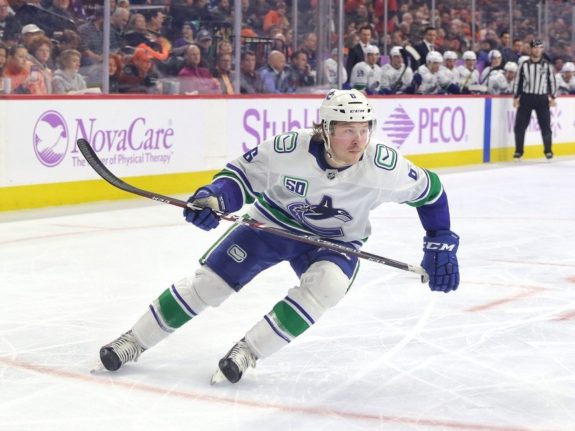
Boeser was 22 at the time of his signing and fetched a three-year deal worth $5.875 annually against the cap. His PPG average up until that point was 0.83 – almost identical to Svechnikov’s. The only major difference here is age. Svechnikov is two years younger than Boeser was, and was also a more highly touted prospect at the time of his draft selection.
Does Svechnikov have a higher ceiling than Boeser? Almost certainly, and that may be one of the arguments from Svechnikov’s camp.
Matthew Tkachuk
Matthew Tkachuk is a more extreme comparison. Coming off a 77-point season, the rugged winger landed himself a three-year, $21-million contract with the Calgary Flames. He’s a former seventh-overall pick in 2016, giving him yet another thing in common with Svechnikov.
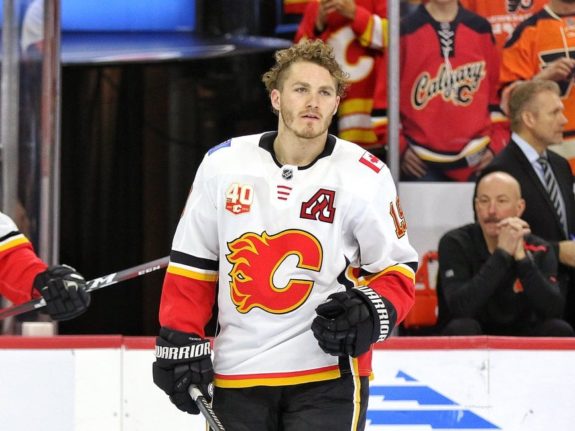
The difference is Tkachuk potted 34 goals in his contract year. It was the best season of his young career – a progressive improvement that seemed to indicate he’d be able to add on to that in the next three seasons. Svechnikov isn’t at that level yet.
Travis Konecny
Another former first-round pick, Travis Konecny signed a six-year deal with the Philadelphia Flyers in 2019 worth $33-million following back-to-back seasons of 47 and 49 points. The winger’s contract carries an AAV of $5.5-million. Konecny carries a few comparables to Svechnikov, but wasn’t quite the same impact player at the time. Svechnikov has a higher PPG average and is two years younger than Konecny when he was up for his pay day.
Because Konecny signed for a longer tenure at six years, the Flyers were able to knock down his AAV. Had he signed for two or three years, like the others above, his cap hit certainly would have been higher.
Timo Meier
Timo Meier draws comparisons to Svechnikov in terms of play style, and in 2019, he signed a four-year, $24-million contract with the San Jose Sharks. His $6-million cap hit is probably in the vein of what Svechnikov is looking at, but once again, Meier was 22 when he locked himself in with the Sharks. He was also rewarded after a career-high 30-goal, 66-point season.
Svechnikov has a long way to go until he’s eligible for unrestricted free agency – four more seasons will push him to a total of seven, which will make him eligible for UFA status. That’s not the kind of territory the Hurricanes want to find themselves in, so that leaves two probable options on the table.
Bridge Deal vs. Long-Term Contract
While I believe both camps are looking at hashing out a long-term agreement, the ideal bridge scenario for the Hurricanes – if it comes to that – would be two years. That puts Svechnikov up for a new deal in 2023-24, which is one year before Aho, Teravainen, Pesce and Brady Skjei all reach UFA status. That’s already going to be a stressful summer, and the last thing Waddell and the Hurricanes want is to add Svechnikov to that list.
For that reason, it makes all the sense in the world to iron out a big contract for their young superstar. That’s why the Hurricanes are in such a good position – they can leverage Svechnikov’s down year to get that big contract with a stomachable cap hit.
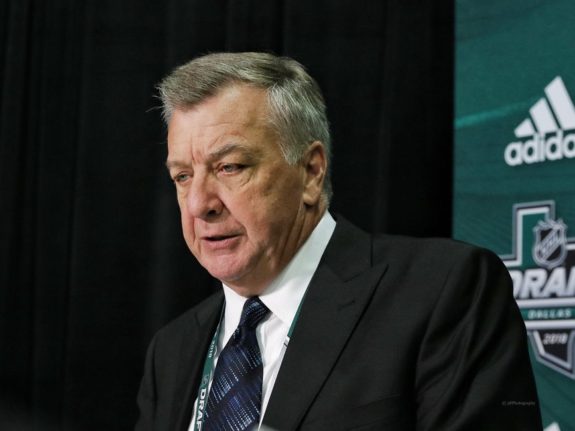
Judging by previous contracts around the league, the flat salary cap, and all the other factors surrounding the Russian power forward, Svechnikov is looking at a six- or seven-year deal with an AAV anywhere between $6- and $6.25-million.
There really shouldn’t be any problem re-signing Svechnikov. The Hurricanes are going to be busy in the coming weeks with all their RFAs, the Hamilton situation and perhaps most importantly, offering Brind’Amour a new contract to return as head coach.
These other decisions are more time-sensitive, so they’ll understandably take priority. Because at it its core, the Svechnikov situation is really quite simple. All that’s left to do is get it done.